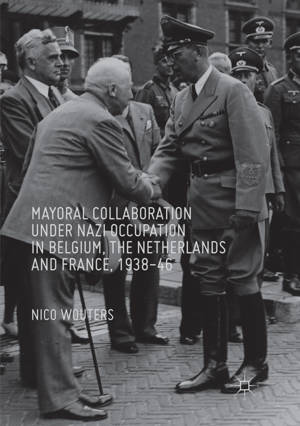
Bedankt voor het vertrouwen het afgelopen jaar! Om jou te bedanken bieden we GRATIS verzending (in België) aan op alles gedurende de hele maand januari.
- Afhalen na 1 uur in een winkel met voorraad
- In januari gratis thuislevering in België
- Ruim aanbod met 7 miljoen producten
Bedankt voor het vertrouwen het afgelopen jaar! Om jou te bedanken bieden we GRATIS verzending (in België) aan op alles gedurende de hele maand januari.
- Afhalen na 1 uur in een winkel met voorraad
- In januari gratis thuislevering in België
- Ruim aanbod met 7 miljoen producten
Zoeken
Mayoral Collaboration Under Nazi Occupation in Belgium, the Netherlands and France, 1938-46
Nico Wouters
Paperback | Engels
€ 213,95
+ 427 punten
Omschrijving
This book explores the role of mayors in navigating the realities of living and governing under Nazi occupation. In Western Europe under Nazi occupation, mayors of villages and cities were forced into strategic cooperation with the occupier. Mayors had to provide good governance, mediate between occupier and populations, maintain personal legitimacy, and build local consensus. However, as national systems underwent authoritarian reform and collaborationists infiltrated administrations, local governments were gradually turned into instruments of Nazi control and repression. Nico Wouters uses rich new archival data to compare the realities of local government in three countries. Looking at topics such as food supply, public order and safety, forced labour, the repression of resistance, the persecution of the Jews and post-war purges, this book redefines our knowledge of collaboration, resistance and accommodation during Nazi occupation.
Specificaties
Betrokkenen
- Auteur(s):
- Uitgeverij:
Inhoud
- Aantal bladzijden:
- 350
- Taal:
- Engels
Eigenschappen
- Productcode (EAN):
- 9783319813813
- Verschijningsdatum:
- 14/06/2018
- Uitvoering:
- Paperback
- Formaat:
- Trade paperback (VS)
- Afmetingen:
- 148 mm x 210 mm
- Gewicht:
- 435 g

Alleen bij Standaard Boekhandel
+ 427 punten op je klantenkaart van Standaard Boekhandel
Beoordelingen
We publiceren alleen reviews die voldoen aan de voorwaarden voor reviews. Bekijk onze voorwaarden voor reviews.









